
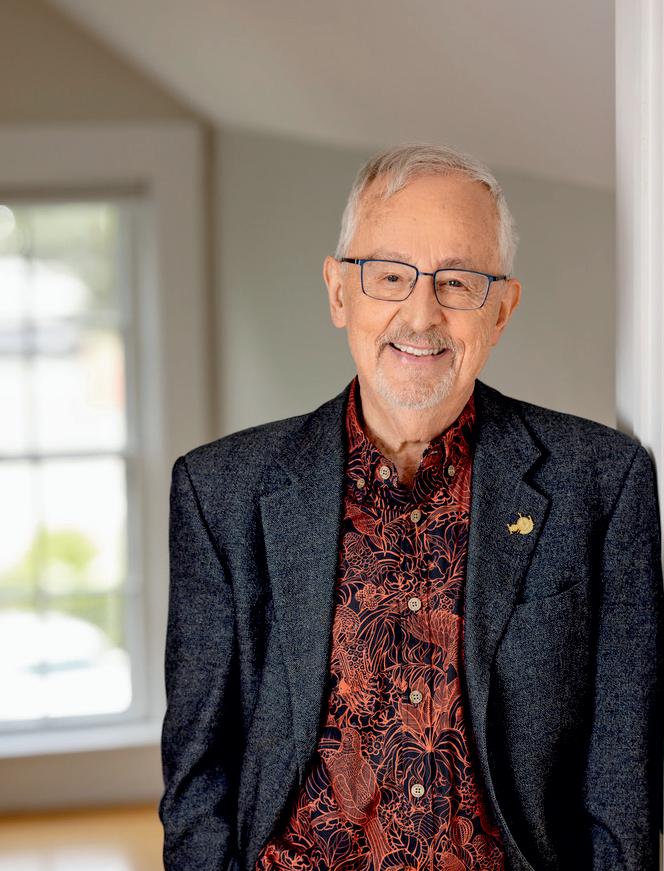

SCAN THE QR CODE REGISTER NOW
Because your story deserves the spotlight






SCAN THE QR CODE REGISTER NOW
Because your story deserves the spotlight



Visionary leaders in education transcend traditional boundaries, reimagining how
knowledge is created, shared, and applied. They view education not only as instruction but as a catalyst for empowerment and transformation. Through intellectual rigor, purpose, and innovation, they pioneer new models of learning that connecttheorywithpractice,expandaccess,andequipfuturegenerationstosucceedina rapidlychangingworld.Theirlegacyisdefinedbytheopportunitiestheycreate,thelives theyimpact,andthecultureoflifelonglearningtheyinspire.OnesuchleaderisRichard Larson,whohasredefinededucationthroughgroundbreakingresearchandinnovation.
Insights Success in its recent edition titled The Most Respected American Voice in LearningandEducation,2025honorsRichardLarsonforhisexceptionalcontributions as a lifelong learner, educator, and innovator Throughout his career at MITand beyond, Larsonhascombinedintellectualrigorwithvisionaryteaching,advancingbothresearchin operations and access to quality education. Together with his late wife, Mary Elizabeth Murray (“Liz”), he championed educational equity through initiatives like MIT’s BLOSSOMS program, which expanded learning opportunities worldwide. This shared missionofempowermentremainsthedefininghallmarkofhislegacy.
Even in retirement, Larson remains intellectually engaged and active. He continues to write,lecture,andpromotetheconceptofModel-BasedThinking,encouragingindividuals to apply analytical frameworks to improve everyday decision-making. His philosophy affirms that learning is not confined by age or institution but is instead a lifelong pursuit driven by curiosity and purpose. Larson’s journey illustrates that true education extends wellbeyondtheclassroom.Itisaboutfosteringcreativity,resilience,andinsight—qualities he has consistently embodied throughout his career. In doing so, he has left a lasting influenceonstudents,academicinstitutions,andcommunitiesworldwide.
Haveagreatreadahead!

Editor-in-Chief
Merry D'Souza
Managing Editor Executive Editor Assistant Editor
Preston Bannister
Jenny Fernandes
Michael Wayne
Visualizer Art & Design Director Associate Designer
David King
Senior Sales Managers
Bruno Alves, Jack McDowell
Marketing Manager Technical Head
James M.
Jacob Smile
Rosy Scott
Irvin Wilson
SME-SMO Executive
Steve Rodrigues
Robert Brown
Angela Ruskin
Business Development Manager
Ryan Brown
Sales Executive
Max Floyd
Business Development Executives
Simon, Tom
Dominique T.
Technical Specialist Digital Marketing Manager Research Analyst
Frank Adams

Circulation Manager September, 2025
Stella Andrew
sales@insightssuccess.com

David Stokes


Follow us on : www.facebook.com/insightssuccess/ www.x.com/insightssuccess We are also available on :


Copyright © 2025 Insights Success , All rights reserved. The content and images used in this magazine should not be reproduced or transmitted in any form or by any means, electronic, mechanical, photocopying, recording or otherwise, without prior permission from Insights Success. Reprint rights remain solely with Insights Success.










Foroversixdecades,RichardLarsonhasexemplified whatittrulymeanstobealifelonglearner,educator, and innovator His career spans groundbreaking research,transformativeteaching,andarelentlessdedication to using knowledge as a tool for social betterment.Whether through academic contributions in operations research, leadershipatMIT,orhiscommitmenttoaccessibleeducation, Larson has continually sought ways to bridge theory and practice.Hisstoryisn’tmerelyoneofacademicsuccess—itis a powerful narrative of how intellectual curiosity, when coupled with purpose, can redefine fields, institutions, and lives.
Larson’s professional journey has been deeply personal. Alongside his late wife, Mary Elizabeth Murray (“Liz”), he worked tirelessly to make education more inclusive and impactful.Theircollaborationextendedfromlecturehallsto global education outreach, including the BLOSSOMS initiative at MIT While academic accolades adorn his résumé, it is this shared mission of empowerment through knowledgethatdefinesLarson’slegacymostprofoundly
Today, even in retirement, Richard Larson remains as intellectually engaged as ever. From writing to public speaking, he continues to advocate for “Model-Based Thinking,” helping individuals apply analytical frameworks toeverydaydecision-making.Hisjourneyillustratesthatthe pursuit of knowledge is not bound by age, title, or institution—it is a lifelong endeavor fueled by passion, purpose, and a deep belief in the transformative power of learning.
Richard Larson attributes the foundation of his academic successtohisearlyadmissiontotheMassachusettsInstitute of Technology (MIT), a pivotal moment that shaped the trajectory of his life.At just 18, fresh out of Needham High School, he joined MIT as a freshman. Despite initial family considerations about affordability, he moved onto campus with the support of the Phi Beta Epsilon (PBE) fraternity. Unlike most MIT fraternities situated off-campus, PBE was located on Memorial Drive, placing him in the heart of academicactionandgivinghimaclose-knitsupportsystem.
ThisimmersioninMIT’srigorousacademicenvironmentand thecamaraderieofthefraternitynurturedbothhisintellectual and personal development. As he progressed through his studies, Larson discovered a deepening fascination with complex systems and decision-making processes, which eventually led him to pursue graduate studies in Operations
Research.HisPhDjourneyculminatedunderthementorship ofProfessorAlvinW.Drake,wholaterinvitedhimtojointhe MITfaculty—aproposalthatinitiallyleftLarsonuncertain.
Acceptingthepositiondespitehisreservations,heeventually found his footing, rising through the ranks to become a tenuredprofessor Itwasaroleheembracedwithincreasing passion,drawntotheintersectionoftheory,application,and human-centered learning. This early period of his academic journey laid the groundwork for his future contributions acrossdisciplines.
Richard Larson’s teaching philosophy extends far beyond traditional pedagogy. While lecturing was undoubtedly a significantpartofhisjob,itwasthementoringofstudentsthat truly defined his academic career. The deeper, sustained relationshipsformedthroughsupervisingthesesandguiding research projects became the most fulfilling aspect of his professionallife.
Larson believed that education was not about rote dissemination of information it was about cultivating intellectual independence, creativity, and discipline. His students were encouraged to push the limits of conventional thinking, question assumptions, and solve real-world problems.Manyofthesestudentswentontobecomeleaders in academia, industry, and government, often referencing Larsonasakeyinfluenceintheirjourney
This emphasis on mentorship reflected his broader commitment to shaping future innovators. In Larson’s view, the role of a teacher was not just to teach but to inspire—to ignite a passion for inquiry that students would carry with themlongaftertheylefttheclassroom.

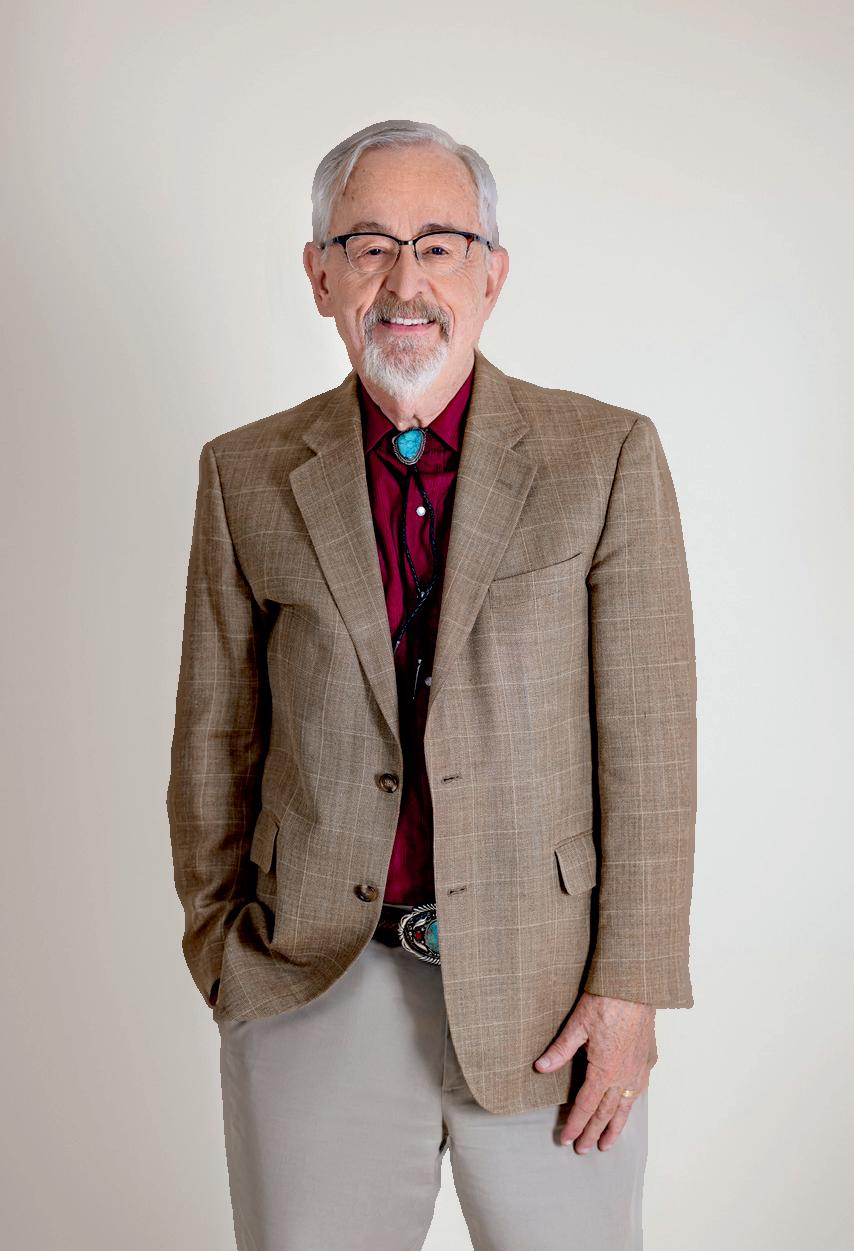





Even in retirement, Richard Larson remains intellectually vibrant and purpose-driven. One of his current passions is promoting “Model-Based Thinking,” an approach that encourages individuals to understand and utilize conceptual frameworks to navigate complex situations His book, MODELTHINKING For Everyday Life,isbothaguideanda philosophy, advocating for the use of analytical tools to improvedecision-makingineverydaycontexts.
Larson’s belief in structured thinking as a life skill underscores his broader educational vision: that learning should not be limited to academic institutions or professionals Everyone from business leaders and policymakers to parents and students—can benefit from understanding the models that shape our choices, risks, and outcomes.
His work today focuses on bringing these ideas into public discourse, using accessible language and real-world examples.Throughmediaappearances,writing,andspeaking engagements, Larson continues to reach new audiences, democratizingknowledgeintheprocess.
LarsonoftenquotesAlbertEinstein:“Adaywithoutlearning isadaywasted.”Thissentimentencapsulateshisphilosophy oflifelonglearning.Tohim,learningisnotafiniteendeavor but a daily practice that can take many forms—whether it’s decipheringanewresearchchallengeorobservingsomething novelindailylife.
He recalls moments when profound insights came to him in dreams, such as a breakthrough related to the Hypercube Queueing Model a framework that transformed urban emergency response planning. These instances reflect his beliefthatthemind,whennourishedbycuriosity,continuesto workeveninunconsciousstates.
Larson’smessageisclear:oneneednotbeinaclassroomto learn. True education is about maintaining a mindset of exploration,alwaysseekingnewideasandsolutions.
Richard Larson’s contributions to education extend well beyondhisownresearchandteaching.Astaunchadvocatefor equityinlearning,hehaschampionedinitiativesthatbroaden access to quality education for underrepresented
communities. One example is his support of Notre Dame CristoReyHighSchool,wherehecontributedtoempowering studentsfromeconomicallydisadvantagedbackgrounds.
At MIT, he solidified his legacy by endowing the Larson Faculty Chair in Data, Systems, and Society. This initiative ensures that future scholars can pursue critical research in these domains, extending the impact of his work for generations to come. His philanthropy reflects a deep belief thatknowledgeshouldbeusedtoupliftothers,notmerelyto advanceindividualcareers.
Like any great journey, Richard Larson’s path has been marked by challenges. One particularly humbling moment cameearlyinhiscareer,whenhefailedtoadequatelyexplain a concept during a teaching assistantship. Rather than shy away from the experience, he used it as a turning point committing himself to rigorous preparation and thoroughunderstandingbeforeeverylecture.
This event shaped his approach to teaching and learning, reinforcing his belief that humility and discipline are vital components of academic success. It also instilled in him a lasting respect for the teaching profession, where every question—no matter how simple—deserves a thoughtful answer.
At the core of Richard Larson’s life and work was his partnershipwithhislatewife,Liz.Foroverfourdecades,they supported each other personally and professionally, especially in their shared passion for education. Liz’s leadershipintheMITBLOSSOMSinitiativeandherrolein his consulting firm, ENFORTH Corp., demonstrated her unwavering dedication to expanding educational opportunities.

Theircollaborationstookthemaroundtheworld,includinga memorable moment when Liz confidently addressed a large audience in Saudi Arabia. Her death, nearly two years ago, wasaprofoundloss,butLarsoncontinuestocarryherspirit forwardineveryendeavor
Theirmarriagewasamodelofsharedvision,mutualrespect, and enduring love—an integral part of his journey that enrichedbothhisprofessionalandpersonallife.
Despitebeingretired,RichardLarsonremainskeenlyaware ofshiftsintheacademicandtechnologicallandscape.Hesees Artificial Intelligence (AI) as both an opportunity and a challenge for education. While AI can enhance learning experiences,hewarnsagainstoverrelianceandtheerosionof criticalthinkingskills.
Larsonbelievesthataseducatorsandresearchersnavigatethe rise of AI tools, they must prioritize intellectual integrity, creativity, and ethical reasoning. These human qualities, he asserts, will always be essential, even as machines become increasinglycapable.
Toaspiringresearchersandeducators,RichardLarsonoffers timeless advice: “Follow Your Learning Passions.” He urgesstudentstoremaincurious,challengeconventions,and takeintellectualrisks.Itisoftenintheunchartedterritoriesof
thought,hesays,thattruebreakthroughsoccur.
Two of his most influential contributions—the Hypercube Queueing Model and the Queue Inference Engine—were born from this mindset. Both models have had a lasting impact on fields ranging from emergency response to operations management, proving that curiosity-driven researchcanyieldreal-worldchange.
He encourages young minds to seek knowledge beyond books, immerse themselves in real-world problems, and neverlosesightofthebroaderimplicationsoftheirwork.
Richard Larson’s life is a testament to the transformative power of education, not just as a career but as a calling. His journey from a young MITfreshman to a globally respected academic has been marked by intellectual rigor, personal integrity, and a tireless commitment to making knowledge accessibleandmeaningful.
Even today, as he advocates for Model-Based Thinking and public engagement, he embodies the spirit of curiosity that hasdefinedhisentirecareer.ForRichardLarson,thepursuit of knowledge is not just an academic endeavor—it is a lifelongjourneyofgrowth,purpose,andservicetoothers.
His message is clear: Learn deeply, give generously, and neverstopexploring.Becauseintheend,themostprofound legacy one can leave is a mind awakened and a life transformed—throughlearning.





The academic world is in constant flux, shaped by technological disruption, societal changes, and evolving educational needs.At the forefront of this transformation standemergingacademicvisionaries,individualswhoseideasand leadershipredefinehowknowledgeiscreated,shared,andapplied. These visionaries are not only teachers and researchers but also innovators, institution builders, and thought leaders who inspire changebeyondclassroomsandcampuses.Theirroleisparticularly vitalatatimewhenhighereducationisexpectedtoadapttorapid digitalization,addresspressingglobalchallenges,andequipfuture generations with the skills necessary for a complex and unpredictable world. Understanding the importance of emerging academic visionaries requires examining their multifaceted contributions. They provide new directions in pedagogy and research, bridge the gap between theory and practice, and push institutionstowardinclusivity,sustainability,andglobalrelevance. In doing so, they become catalysts for progress, ensuring that academia remains a dynamic force capable of responding to contemporaryandfuturechallenges.


One of the most significant roles of emerging academic visionaries lies in their ability to shape the future of knowledge itself.These individuals bring fresh perspectives to established disciplines, reinterpreting frameworks, and challengingtraditionalassumptions.Bydoingso,theycreate spaceforinterdisciplinaryexploration,whichisincreasingly necessarytoaddresscomplexissuessuchasclimatechange, public health crises, and ethical dilemmas around artificial intelligence. Their curiosity-driven research ensures that knowledgeisnotstaticbutcontinuestoevolve,reflectingthe realitiesofaglobalizedandinterconnectedworld.
Inpedagogy,visionariesreimaginehowlearningisdelivered and experienced. They embrace technology-enhanced education, personalized learning approaches, and collaborative problem-solving methods that go beyond rote memorization. By creating more engaging and inclusive classrooms, they empower students to think critically, question assumptions, and apply knowledge to real-world challenges. In this way, emerging academic leaders do more thanteach;theycultivatelifelonglearnerscapableofadapting toconstantchange.
Emerging academic visionaries also play a crucial role in drivingtransformationwithininstitutionsandsociety Within universities, they advocate for reforms that make higher education more accessible, equitable, and aligned with societalneeds.Thismayinvolvechampioningdiversefaculty recruitment, fostering inclusive curricula, or leading initiatives that connect academic research with local communities Such efforts ensure that higher education institutionsdonotremaininsularbutinsteadbecomeengines ofsocialmobilityandplatformsforaddressinginequities.
Beyond campus walls, their influence extends into policymaking, industry collaboration, and global engagement. Academic visionaries increasingly act as bridges between research and practice, translating scholarly work into solutions for pressing societal issues. Whether throughpartnershipswithbusinessestoadvanceinnovation, collaborationswithgovernmentstoshapepolicy,oroutreach programs that serve marginalized populations, their contributions amplify the relevance of academia. By positioningeducationasadriverofbothsocialprogressand economic development, they demonstrate that academia is notanisolatedpursuitbutaforcewithfar-reachingimpact.
Perhapsthemostenduringimportanceofemergingacademic visionaries lies in the legacy they cultivate. Their work inspires future scholars, educators, and leaders to carry forwardthetorchofinnovationandethicalresponsibility By mentoring students and junior faculty, they help build pipelinesoftalentthatensureacademiacontinuestoevolvein step with global needs. This mentoring extends beyond technical knowledge to instill values of integrity, curiosity, and social commitment qualities essential for any generationtaskedwithtacklingthechallengesoftomorrow
At the same time, these visionaries help redefine what leadership means in academia Instead of hierarchical authority, they often model collaborative and inclusive leadershipstyles,emphasizingdialogue,sharedgovernance, and collective problem-solving. Their ability to inspire changewithoutimposingit,tofostercommunitiesofpractice rather than silos of expertise, creates a culture where innovation thrives As such, their leadership becomes a templatenotonlyforacademiabutalsoforothersectorsthat looktoeducationasasourceofguidanceandrenewal.
Emergingacademicvisionaries’matterbecausetheyembody thetransformativespiritnecessarytokeepeducationrelevant andimpactfulinarapidlychangingworld.Theyarearchitects ofnewknowledge,reimaginesofpedagogy,andcatalystsfor institutional and societal change. More importantly, they nurturethenextgenerationofthinkersandleaders,ensuring thatacademiacontinuestoserveasavitalengineforprogress. By bridging theory with practice, fostering inclusivity, and modelinginnovativeleadership,theseindividualsensurethat educationremainsnotjustameansofpersonaladvancement but a collective force for shaping a better future In recognizing and supporting the contributions of emerging academic visionaries, societies invest in a legacy of knowledge, resilience, and hope. Their importance is not limited to academia; it reverberates across every domain wherehumaningenuityandethicalresponsibilityareneeded tochartasustainablepathforward.

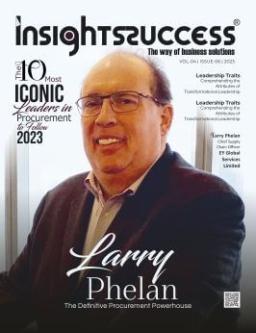



www.insightssuccessmagazine.com

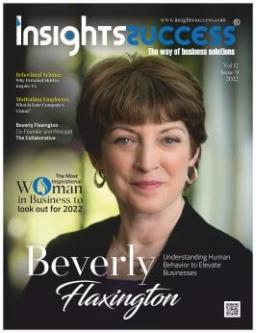
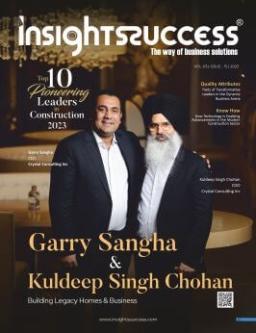


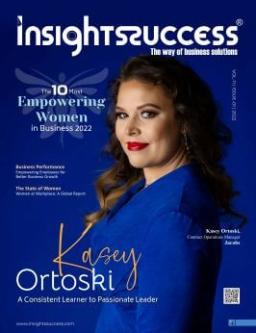


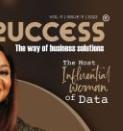


Highereducationisataninflectionpoint,markedby sweeping technological, social, and global transformations.Thetraditionalmodelofacademic leadership, centered on administrative efficiency and institutionalprestige,isnolongersufficientforthechallenges ahead. Today’s academic leaders must navigate a terrain shaped by digital disruption, globalization, demographic shifts,andgrowingdemandsforequityandinclusion.Thisis not merely an incremental change but a fundamental redefinition of what it means to lead in higher education.At theheartofthisshiftisarecognitionthatuniversitiesarenot just centers of teaching and research, but also drivers of innovation, social responsibility, and global collaboration. Leadershipnowdemandsvision,adaptability,andtheability toalignacademicmissionswithsocietalchallenges.Thenext era of academic leadership is less about preserving established hierarchies and more about cultivating ecosystems where collaboration, diversity of thought, and innovation can thrive. It calls for leaders who can bridge traditionandtransformation,creatinginstitutionsthatremain relevantinarapidlyevolvingworld.

The role of academic leaders has expanded far beyond managing faculty, overseeing curricula, and sustaining infrastructure. They are now expected to act as visionaries who balance competing priorities: preserving intellectual traditionswhileembracingdisruptivetechnologies,nurturing scholarshipwhileencouragingentrepreneurship,andserving localcommunitieswhileexpandingglobalengagement.This multifaceted role requires leaders to be both pragmatic and innovative,abletobridgethegapbetweenacademiaandthe evolving world beyond campus walls. Equally important is the shift toward inclusivity and shared governance. Modern campuses are diverse, representing a wide spectrum of cultural,socioeconomic,andgenerationalperspectives.
Leadersmustfosterenvironmentswhereallvoicesareheard andvalued,ensuringthatinstitutionalpoliciesreflectfairness and equity Leadership in this context is less about authority andmoreabouttrust-building.Creatingacultureofdialogue, accountability, and collective ownership of institutional progresshasbecomeacentralpartoftheleadershipmandate. Strongleadershipismeasurednotbycontrolbutbytheability toempowerotherstoleadalongsidethem.Thisredefinedrole also highlights the importance of adaptability. Academic leaders cannot rely solely on past practices or traditional hierarchies to guide their institutions. Instead, they must cultivate a forward-looking mindset that anticipates change and embraces experimentation By promoting interdisciplinarycollaboration,fosteringpartnershipsbeyond academia,andencouraginginnovativeteachingandresearch methods, leaders can prepare their institutions to thrive in a future where flexibility and creativity are as valuable as academicrigor.
Technologyhasbecomeadefiningforceinhighereducation, reshapinghowknowledgeiscreated,shared,andapplied.The rise of artificial intelligence, data analytics, and online learning platforms demands that leaders make strategic choices about digital integration. They must ensure technology enhances learning and research while safeguarding academic integrity and the human connections central to education This requires not only technical understandingbutalsoethicalforesightinareassuchasdata privacy,accessibility,anddigitalequity.
Forleaders,thechallengeliesinadoptingtechnologyinways thatelevateeducationratherthanallowingittoerodeitscore values. At the same time, globalization is intensifying the
interconnectedness of higher education. Institutions are forging international collaborations, expanding student mobilityprograms,andcontributingtocross-borderresearch initiatives. Leaders must navigate geopolitical uncertainties, culturaldifferences,anddiverseregulatoryframeworkswhile maintainingtheirinstitutions’coremissions.
Preparing institutions for an uncertain future is perhaps the most critical responsibility of academic leaders today This involves anticipating shifts in student expectations, workforce needs, and societal priorities, then designing strategiesthatkeepuniversitiesagileandrelevant.Curricular reforms must equip students with adaptability, critical thinking, and interdisciplinary skills to thrive in complex environments. Research agendas should address pressing challenges such as climate change, healthcare, and social inequality, affirming higher education’s role as a driver of positivesocietalchange.
Resilience is another key marker of effective leadership. Institutions face mounting pressures, including financial constraints, policy changes, and global crises. Leaders must embedresilienceintogovernancestructures,fundingmodels, andacademiccultures,ensuringinstitutionscanadaptswiftly without compromising their missions Flexibility and innovation, rather than rigid control, will define sustainable leadership.
The unveiling of the next era of academic leadership is an invitationtoreimaginethefutureofhighereducation.Leaders mustembodyablendofvisionandpragmatism,traditionand innovation,localengagementandglobalreach.Theirroleis no longer confined to administration but extends to shaping institutionsthatareinclusive,technologicallyadept,globally connected,andresilientinthefaceofdisruption.Inthisnew landscape,themostsuccessfulacademicleaderswillbethose who understand that leadership is not about command but about collaboration. It is not about preserving the past but aboutpreparingforthefuture.







